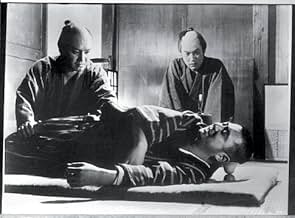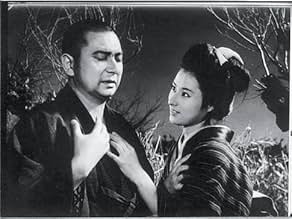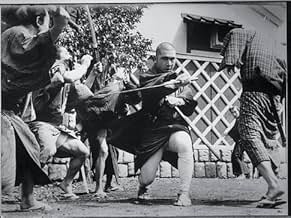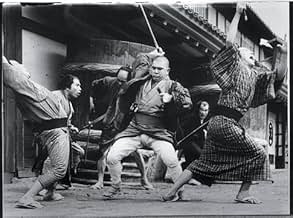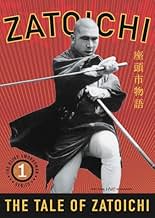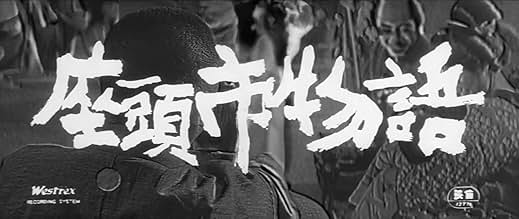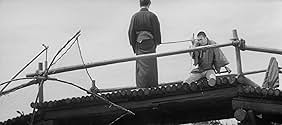Aggiungi una trama nella tua linguaThe adventures of a blind, gambling masseur who also happens to be a master swordsman.The adventures of a blind, gambling masseur who also happens to be a master swordsman.The adventures of a blind, gambling masseur who also happens to be a master swordsman.
- Regia
- Sceneggiatura
- Star
- Premi
- 1 candidatura in totale
- Masakichi
- (as Toshirô Chiba)
- Yahei
- (as Yoshito Yamaji)
Recensioni in evidenza
There are several elements that make this movie so outstanding. First of all, the film's authentic settings bring the culture and history of rural Japan to life in a very authentic way. Secondly, the protagonist convinces as a man who relies on his moral compass and cleverness first and foremost and only draws a sword if he doesn't have any other choice. Thirdly, the numerous side characters are quite interesting as well, especially Zatoichi's wise opponent Hirate, the ruthless criminal Tate and his proud but desperate sister Otane who ends up falling in love with Zatoichi. Fourthly, the dialogues are really to the point and add something to characters and plot unlike many contemporary martial arts flicks. Fifthly, the few fight sequences in the movie are carefully choreographed and would go on to inspire any other genre film that would follow this movie.
By today's standards, The Tale of Zatoichi might not be the most vivid genre film but it's crafted in an artistic, detailed and intellectual manner that still stands out far over five decades after its initial release. Any martial arts fan should give this movie a chance. I would highly recommend the stunning Criterion Collection of the Zatoichi movies that truly offers value for money. Movies of this quality are rarely made nowadays and should be hold in high regard.
Set toward the end of the feudal Edo period (1603-1868), the film stars Shintaro Katsu as Zatoichi, an itinerant blind masseur/swordsman. He stops in the town of Iioka one day to stay with a yakuza boss, Sukegoro, who he had met on an earlier journey.
Zatoichi is humble, but has a quiet intensity. Even though he is blind, he perceives more in the situations around him than the other participants with normal eyesight. In an early scene, Sukegoro's gangsters try to take advantage of Zatoichi in a game of dice, but he uses their underestimation of him to his advantage, and hustles the gamblers out of all their money.
Zatoichi insists his impressive skills with the katana are nothing more than parlor tricks, but Boss Sukegoro hires him to stay on, as he has plans to go to war with a rival gang in nearby Sasagawa. Sasagawa boss Shigezo hires a ronin samurai, Hirate, to counterbalance Sukegoro's Zatoichi.
Zatoichi and Hirate develop a sort of friendship, but their affection toward each other has less to do with their love of fishing or drinking than on their common code of honor. Even though they know they will be expected to fight to the death in the war between Iioka and Sasagawa, this doesn't stand between their personal friendship.
So it follows that the most interesting conflict in the movie is not the yakuza warfare between the Iioka and Sasagawa gangs, but the conflict between Zatoichi and Hirate. Hirate is dying of consumption, and seems to prefer death by Zatoichi's sword rather than let his illness or an unworthy gangster take his life.
"The Tale of Zatoichi" is both fun and stylish. But rather than being a by-the-numbers action flick, the filmmakers took the time to develop characters the audience can actually care about, which elevates Zatoichi above other films of this genre.
This is the first in a series of 26 Zatoichi films (and a television series that ran for four seasons in the 1970s), all starring Katsu in the title role. Remarkably, 25 of the Zatoichi films were made in little more than a ten-year period. This first film was based on a short story by Kan Shimozawa.
I haven't seen most of the Zatoichi films yet, and I hadn't seen any of them for a long time, so it's difficult for me to compare Zatoichi 1 with the rest of the series, but I was slightly disappointed with this film. It's a bit too much in the realm of realist drama for my tastes, and as such, moves at a slow clip. There are no big fight scenes until the last 20 minutes or so, and those aren't filmed, directed or choreographed very spectacularly. But the black and white cinematography (which only lasted for one more Zatoichi film) is frequently arresting and the dramatic material does present some intriguing situations, many concerned with various shades of ethical grayness. If you're in the market for an Asian "art-house" drama with a slight martial arts edge, Zatoichi 1 may be just the film for you. If you're looking for something more visceral, or for exciting action, it would probably be safe and wiser to start later in the series.
The visual style caught my attention more often than any other aspect of Zatoichi. Director Kenji Misumi, who went on to do five more Zatoichi films after this one, has cinematographer Chishi Makiura shoot in a stark black and white that has a strong, even exaggerated film noirish edge. The whites can be almost blinding and the darks are pitch black. There are a lot of shadows. Much of the film takes place at night and indoors. It's an attractive way to use the minimal sets. The scenes set in different environments are pleasant in their contrast. A scene at a lakeside begins with a Zen Art-styled water through branches shot. The big fight scene near the end has some interesting lake shots and even better village labyrinth shots. The climactic Western (the genre)-like showdown on a bridge is also nicely staged and photographed.
The story, using a script by Minoru Inuzuka, focuses on interesting character arcs for the two principals--Zatoichi and Hirate. Especially Zatoichi has a questionable morality when the film begins, but both gradually come to be more concerned with being honorable, just and unselfish by the film's end. This is in contrast to the characters embroiled in romantic relationship dilemmas--Otane (Masayo Banri), Tatekichi (Michio Minami) and Seisuke (Manabu Morita), and even the gang bosses, Shigezo and Sukegoro, who all have little to no character development arc, although Otane is already ethically good (per the conventional wisdom) at the beginning of the film.
But Zatoichi and Hirate are initially set against each other as surrogate representatives of warring "families", in what amounts to a yakuza/samurai version of Romeo & Juliet (and by extension West Side Story, 1961). Of course there is no romantic angle between Zatoichi and Hirate, but there is a deep respect and a bonding through a brotherly love that eventually triumphs in its own way over "turf wars". There is an expected end to their relationship, but the appearance of this development (most significantly to the gang bosses) is quite different than what is actually going on between the two of them. The romantic angle is covered instead by Zatoichi's relationship with Otane, which has the appropriate air of being forbidden to cover the Romeo and Juliet/West Side Story analogy, and which also ends up being defined by an intriguing selflessness that rarely rears its head in western (the culture) films.
Zatoichi is a fascinating character. Katsu doesn't have a typical martial arts or action star look--already in this film, he appears to be middle aged (beyond his actual age of 30 at the time of shooting) and a bit chubby. His "sixth sense" abilities and cunningness verge on the magical, as do his swordsmanship skills. The character isn't nearly as well explored here as he could be, but given that there were 25 more films to come (and a recent remake with a new Zatoichi), I suppose it's more excusable.
It doesn't help that it takes awhile to get up to speed on the relatively large cast of characters with sometimes complex relationships to one another (especially if you're like me and you have trouble remembering character names as well as trouble remembering who is who when characters have similar looks), but once you figure out that it's a kind of West Side Story, it's easy enough to get the gist of events unfolding.
The reasons why the Zatôichi franchise enjoys such an enormous cult-status are numerous, but I will stick to the most important ones. The eponymous hero, Zatôichi must be the most likable character ever in cinema to work as a hired sword. Zatôichi, a blind masseur, has obtained his sword skills because he was tired of being looked down upon by others, as usual for blind people in Feudal Japan. Due to his excellent sword-skills, he makes a good living as a hired swordsman. His senses of smell and hearing are as excellent as his swordsmanship, which makes him one of the most powerful swordsmen. Even so, Zatôichi is a kind, gentle and humorous man by nature, who will rather solve problems otherwise than having to kill someone. Shintaro Katsu is brilliant in the role of his life, and I cannot imagine for anyone else to fit the role like Katsu did. Cult-filmmaker Takeshi Kitano (of whom I am a great fan) took a new turn on the role in 2003 - Katsu had passed away in 1997 - and did so greatly. Yet, to me, the only true Zatoichi will always be Shintaro Katsu. This first film in the series is one of only two that were filmed in black and white, and it already epitomizes what makes the brilliance of the series. "Zatôichi Monogatari" mixes Smurai Action with Comedy, Drama and philosophical elements. The film begins with the crafty Zatôichi, who tricks a bunch of fellow gamblers into underestimating him... The film marks the beginning to a great and highly successful series that may not be missed by any lover of Japanese cinema. I had seen several other "Zatôichi" films with Katsu, as well as the 2003 film with (and by) Kitano before seeing this one. The action is great in this first film, but it is the plot that outweighs the fighting by far. Overall, "Zatôichi Monogatari" is a fantastic piece of cult-cinema and everybody even remotely interested in Japanese films must see it.
The story of a blind, meek master swordsman "Zatoichi" is very well done, just a notch below Seven Samurai in excellence. The lead actor who plays "Ichi" in almost all the films, Shintaro Katsu, later wrote and directed some entries.
The plots are interesting and characters well-drawn. Anyone who enjoyed the Samurai films of Akira Kurosawa with Toshiro Mifune should enjoy this film and its sequels. "Ichi" is similar to the Mifune characters in his deliberately unprepossessing appearance and aversion to violence, but when he is pushed too far, watch out! Also, despite his blindness and poverty, he is something of a chick-magnet for some very attractive Japanese women.
You can find considerably more detail on Shintaro Katsu and these films on Wikipedia.
Lo sapevi?
- QuizHanji's wife Yoshi practices "ohaguro" (literally: "black teeth"). In many areas of Asia, blackened teeth were considered a sign of beauty and maturity. In Japan, the practice was banned by the government in 1870.
- BlooperIn the moonlit scene by the pond, Tane tells Zatoichi that she has a facial mole exactly like his. But neither character has any such mole.
- Citazioni
Tane: You have a mole here. I wonder if it's a lucky mole. I have one just like it. They say it means I'll have lots of children.
Zatôichi: It's a lucky mole.
Tane: What would I do with so many children.
Zatôichi: Just don't raise them to be yakuza.
Tane: I won't. But why do you say that?
Zatôichi: Because to be a yakuza is a foolish way to live.
Tane: Then why don't you live a decent life?
Zatôichi: It's like being stuck in a bog. It's not easy to pull yourself out once you've fallen in.
- ConnessioniFeatured in Best in Action: 1961 (2018)
I più visti
- How long is The Tale of Zatoichi?Powered by Alexa
- How and when did Zatoichi become blind?
- What is a yakuza?
- How old is Zatoichi?
Dettagli
- Data di uscita
- Paese di origine
- Lingua
- Celebre anche come
- The Tale of Zatoichi
- Azienda produttrice
- Vedi altri crediti dell’azienda su IMDbPro
- Tempo di esecuzione1 ora 36 minuti
- Colore
- Mix di suoni
- Proporzioni
- 2.35 : 1
Contribuisci a questa pagina


